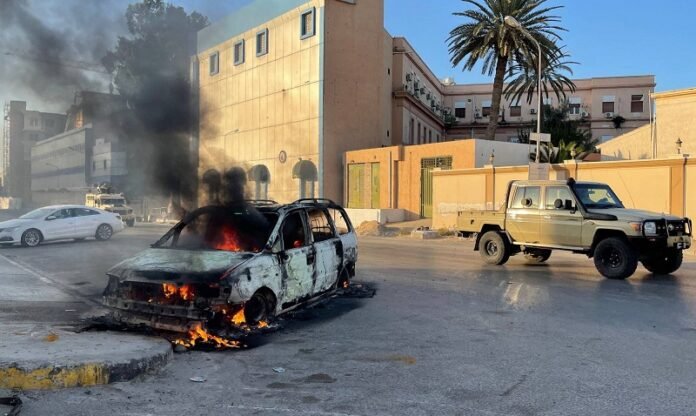Libya, still mired in chaos, has seen its capital once again descend into bloodshed. On Monday night, the streets of Tripoli turned into battlegrounds, forcing residents to hide indoors—a scene more reminiscent of war than of a functioning state. So what happened this time? And who bears the political responsibility for this recurring security collapse?
Street Fighting or Political Messaging?
The latest clashes broke out between rival security factions, each claiming legitimacy and discipline, while reality reveals a fragile balance of terror. Why do these violent episodes erupt whenever there’s talk of restructuring institutions or holding elections? Is this just a security incident, or the symptom of a much deeper political crisis?
The Municipal Council Raises the Alarm… But Is Anyone Listening?
Tripoli’s central municipal council called for an immediate ceasefire, describing the capital as a “war zone” and warning of growing divisions. But is a mere statement enough to stop the destruction? Where is the central authority capable of enforcing peace?
UN and US Condemnations… But For How Long?
The UN Support Mission in Libya and the US Embassy issued swift condemnations. Yet are these reactions enough? Doesn’t Libya now need a more robust and actionable international intervention?
Al-Menfi Breaks His Silence… A Rift with Dbeibah?
Presidential Council head Mohamed al-Menfi met with a delegation from Souk al-Jumaa, a hard-hit Tripoli district. The delegation sharply criticized Dbeibah’s government, accusing it of targeting disciplined security forces. Does this indicate a crack at the top of Libya’s political structure? Is the Presidential Council starting to push back against Dbeibah’s dominance?
Dbeibah Declares “Institutional Victory”… But Against Whom?
In the midst of the crisis, Dbeibah posted that “legitimate institutions” had prevailed. But over whom, exactly? Who defines what is “legitimate” when many of the fighting factions are part of the same government security structure? Has Dbeibah become a manager of militia balances instead of a state builder?
Guemati’s Harsh Accusation… The State Has Lost Its Authority
Prime Ministerial candidate Abdelbasset Guemati called the situation a “tragedy” and accused Dbeibah of both political and security failure, using the state as a cover for corruption. Do these criticisms mark a turning point in Libya’s political discourse? Or are they merely rhetorical without any real alternative on the ground?
Ali al-Takbali: Dbeibah Will Never Be Part of Real Reconciliation
Parliamentarian Ali al-Takbali openly declared that Dbeibah benefits from chaos and cannot be part of any genuine reconciliation process. Tripoli, he said, is suffocating under a heavy burden of armed balances. Is this view representative of broader sentiment in Parliament, or a lone voice?
The Libyan Dilemma: A State Captive to Factions and Legal Vacuum
What’s happening in Tripoli reflects a deeper institutional disintegration: two governments, two security structures, competing claims of legitimacy, and militias dividing cities. Can we still speak of a unified state? Who blocks the unification of security forces? And is the solution still in Libyan hands, or controlled by external backers?
Morocco’s Initiatives… Should They Be Revived?
Morocco previously hosted several rounds of inter-Libyan dialogue, from the Skhirat Agreement to the Bouznika rounds. But why did these agreements not translate into action? Who obstructed them? Is it time to launch a new political track, one that dismantles militias rather than accommodates them?
Conclusion: Tripoli Is Collapsing, and Time Is Running Out
Tripoli is not just a capital under fire—it is a symbol of a nation on the brink. Without genuine political will and effective international engagement, Libya faces a binary future: either an inclusive dialogue based on renewed popular legitimacy, or a descent into deeper fragmentation and violence.
Who will move first before it’s too late? And what kind of Libya do we want to see tomorrow?


